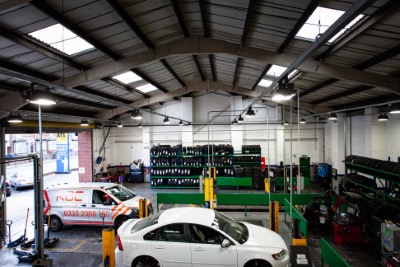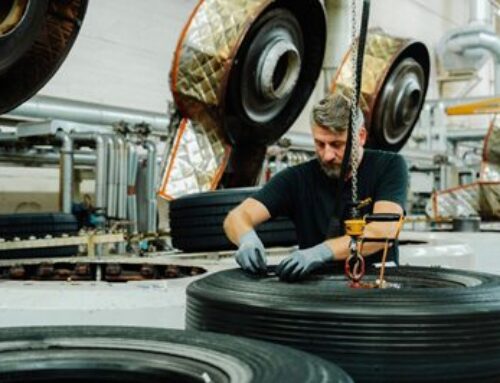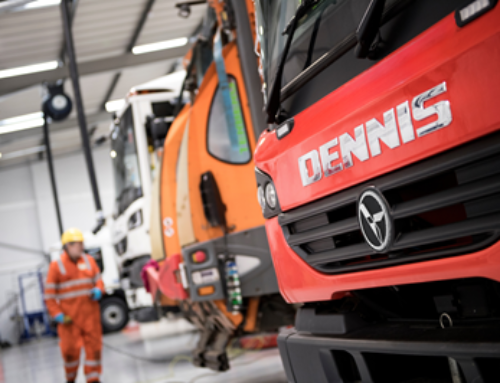ATS Euromaster: prioritising LCV maintenance
 Tyre service specialist ATS Euromaster has highlighted the need for industry to prioritise the maintenance of light commercial vehicles in 2024.
Tyre service specialist ATS Euromaster has highlighted the need for industry to prioritise the maintenance of light commercial vehicles in 2024.
According to Jason Chamberlain, sales director at ATS Euromaster (pictured, right), the issues around availability of new commercial vehicles seen over the past three years led to a new trend of increased CV lifecycles; vehicles that were once replaced after three years or a certain number of miles were suddenly required to go further and run longer than ever before.
“Although new stock availability has improved in recent months, many fleets have continued to run longer lifecycles of their vans, most likely to help minimise outgoings, which has led to an increase in required service, maintenance and repair (SMR) work and increased demand for commercial vehicle MOTs,” said Jason.
He cites government figures highlighting some of the most common causes of failure for Class 7 vehicles at MOT – with lamps, reflectors and electrical equipment proving the likeliest cause of failure, followed by brakes and suspension. In terms of the greatest percentage of dangerous defects, brakes and tyres were the most alarming.
“Extended lifecycles have also borne witness to an uprise in vans with illegally worn tyres,” Jason continued.
“And with brakes and tyres constituting the greatest percentage of dangerous defects, it suggests that regular maintenance is at risk of dropping off the agenda for some van operators.
“This factor alone poses a significant threat to safety; therefore, it is important to carry out tyre maintenance before an issue arises.
“MOT failures will increase fleet operators’ costs. And the increasing costs of parts coupled with the cost-of-living crisis, suggests an increased likelihood that MOT failures will continue to increase as the van fleet ages. Therefore, it is highly recommended that fleet managers plan their SMR work and are proactive in vehicle maintenance to prevent the costliest item of all – a vehicle off road.”
Vans are being worked extremely hard nowadays, says Jason, with much of it final mile delivery work – with innumerable incidences of kerb bouncing and heavy braking in built up areas, that consequently incur greater costs with wheel alignment, shock absorber and suspension work, and damaged tyres on a more regular cycle. And as ‘double shifting’ continues, not only is the van lifecycle extended, but essential downtime decreased, meaning tyre maintenance must be made a priority when it comes to ensuring road safety and fleet efficiency.
 “After all, planned tyre maintenance allows fleet managers to identify future spend, enabling fleets to plan for preventative maintenance and budget accordingly.
“After all, planned tyre maintenance allows fleet managers to identify future spend, enabling fleets to plan for preventative maintenance and budget accordingly.
“It is a good idea for fleet operators who bring in a van for new tyres (for example), to also opt for a vehicle health check at the same time to identify any areas of concern as early as possible. This proactive approach will highlight any issues the van has before they become major and more expensive to fix. This tactic will help keep the vehicle road-worthy, reduce vehicle downtime, safe and support its lifecycle (however long that may be).
“It’s important to make the van work for you and your needs as a fleet operator and to do that, regular vehicle maintenance is required.”
Increased demand for van MOTs and SMR work has seen service providers, like ATSE, recruiting more technicians, he added.
“Investing in technicians increases our ability to maintain the increasing demand for fleet SMR going through our workshops, including EVs.
“Our internal training programme called Safe Systems of Work (which is also accompanied by level 1 EV and hybrid training) provides the groundwork for technicians to carry out the majority of tasks that fleets require before they progress to level 2 standard.
“As a service provider, we aim to ensure van fleet operators who visit our centres know, and can trust, the high level of service and maintenance work we provide. Our aim is to help fleets run as efficiently as possible with the vehicles they have. Getting commercial vehicles serviced by a professional service provider, with fully trained technicians, will ensure SMR work is carried out to a high standard and vehicles are roadworthy, maximising uptime.
“The reality is, costs won’t decrease, but minimising downtime with scheduled van maintenance will help fleet operators budget, and keep vehicles roadworthy and running efficiently throughout their extended lifecycle.”












